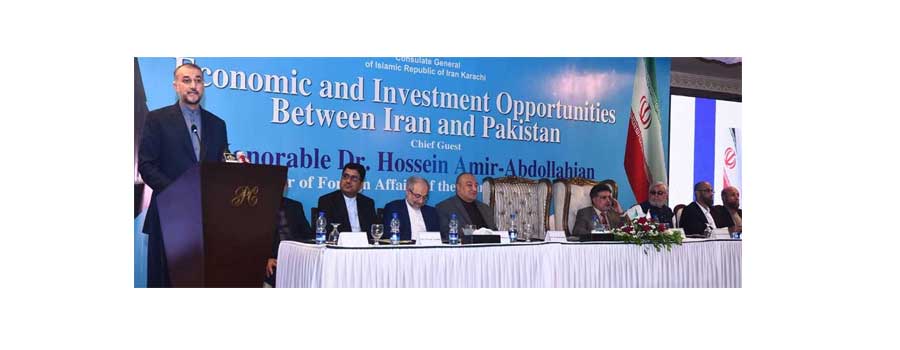Manzar Naqvi
KARACHI: Dr. Hossein Amirabdollahian, the Foreign Minister of the Islamic Republic of Iran emphasised the enduring importance of the relationship between Iran and Pakistan, both being neighboring Muslim countries with deep historical, cultural, and religious ties. He was addressing the “Economic and Investment Opportunities conference between Iran and Pakistan” in Karachi on Friday as the chief guest, he expressed his delight at being present in the bustling economic and commercial hub of Pakistan.
Highlighting recent strides in strengthening bilateral relations, Dr. Amirabdollahian lauded the collaborative efforts that led to the opening of two new border terminals, “Rimdan-Gabed” and “Pishin-Mand,” facilitating trade and connectivity between the nations. Additionally, a Memorandum of Understanding (MoU) has been signed for the establishment of six joint border markets, further enhancing economic cooperation.
Dr Hossein said Both Iran and Pakistan’s strategic geographical locations along international transportation corridors and initiatives such as the Belt and Road Initiative have encouraged mutual efforts to bolster transportation and transit cooperation. Notably, the ports of Chabahar (Iran) and Gwadar (Pakistan) hold tremendous potential for fostering economic ties and regional collaboration.
Amirabdollahian emphasised the inherent complementarity of the two nations’ economies, citing examples where Pakistan can supply Iran’s agricultural needs, while Iran can support Pakistan’s energy requirements.
Projects such as the Iran-Pakistan (IP) gas pipeline and increasing electricity exports from Iran to Pakistan exemplify the practical steps taken to strengthen energy ties.
He said over the years, the total bilateral trade between Iran and Pakistan has witnessed steady growth, surpassing an impressive figure of two billion three hundred million dollars. The two countries’ simultaneous membership in various regional arrangements such as the Economic Cooperation Organisation (ECO), the Group of Eight Developing Islamic Countries (D8), the Shanghai Cooperation Organization, and the Asian Trade Union (ACU), along with cooperative efforts in international bodies like the World Bank, the International Monetary Fund, the Economic and Social Council of the United Nations (ECOSOC), and the United Nations Industrial Development Organisation (UNIDO), provide a conducive platform for further commercial and economic collaboration.
While acknowledging the role of the private sector in driving economic cooperation, Dr. Amirabdollahian expressed Iran’s support for the development of tourism between the two nations, with the Islamic Republic of Iran ready to offer health tourism services to Pakistani citizens.
In conclusion, Dr. Hossein Amirabdollahian expressed his hope that the friendship and brotherhood between Iran and Pakistan will pave the way for ever-increasing bilateral economic and commercial cooperation, strengthening the bonds that have historically united the two nations.
Earlier, Hassan Norian, the Consul General of I.R. Iran in Karachi, delivered a welcoming address highlighting the immense potential and challenges in exploring and availing business and trade opportunities between the two countries. He emphasised the need to enhance bilateral and commercial relations. A documentary showcasing the business and investment opportunities in Iran, which is also recognised that Iran is 18th largest economy in the world, was presented during the event.
Governor Sindh Kamran Khan Tessori attended the conference but had to leave early due to prior engagements after watching the documentary.
The Chief Executive of Trade Development Authority of Pakistan (TDAP) emphasised the importance of seizing the opportunities of barter trade and enhancing business-to-business (B2B) interactions. He shared his positive experiences from a recent visit to Iran, where he observed that despite facing decades of sanctions, Iran’s development across various sectors is remarkable, and the country produces everything it needs domestically.
Addressing the conference the other speakers, including Deputy Foreign Minister of I.R. Iran, Mehdi Safari; Governor-General of the restive Sistan-Baluchestan province of I.R. Iran, Mohammad Karami; SVP of FPCCI, Muhammad Suleman Chawla; and Mir Shabbir Ali Bijrani, Minister of Mines & Mineral Development, representing the Chief Minister of Sindh, Murad Ali Shah, emphasised the significance of economic and investment cooperation between Iran and Pakistan. The conference aimed to foster economic collaboration, providing a platform for business leaders and officials to explore opportunities, address challenges, and pave the way for mutual growth and development.
Following the conference, a significant milestone was achieved as the Karachi Chamber of Commerce and Industry (KCCI) and the Tehran Chamber of Commerce and Industry (TCCI) signed a Memorandum of Understanding (MoU), further strengthening the economic ties between the two countries.
The conference saw the participation of prominent business leaders, government officials, and delegates from both the countries, all expressing enthusiasm and commitment to work together in deepening economic ties and exploring new investment opportunities.
The event was skillfully hosted by the renowned TV Anchor of GTV, Owais Rabbani. At the conclusion of the conference, Mehfile-e-Sama (Qawalis) was performed by Sabri Qawals, adding a delightful touch to the gathering.




